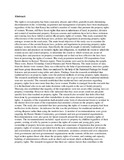| dc.description.abstract | The right to own property has been constantly abused, and efforts geared towards eliminating discrimination in the. ownership, acquisition and management of property have been inadequate, regardless of the fact that Kenya has ratified a number of treaties that promote the property rights of women. Women, still have lesser rights than men in inheritance of land, in practice, division and control of matrimonial property. Kenyan customs and traditions have led to these violations and existing laws have failed to protect the property rights of women.
This study examined the effectiveness of the current Kenyan laws, policies and legislation in protecting property rights amongst women in the rural areas. The main broad objective of the study was to examine the effectiveness of the current Kenyan laws, policies and legislation in protecting property rights amongst women in the rural areas. Specifically the research sought to identify traditional and modem laws and practices on women's rights and obligations, to establish the extent to which the women access and control property, to determine the extent to which women are aware of existing laws and practices on property ownership and to find out how effective the laws have been in protecting the rights of women.
The study population included 150 respondents from Butere district in Kenyas' Western region. Three locations were used in developing the sample. These were, Butere Township, Central Marama and North Marama. The main sources of data from the district were women. Data was collected by the help of questionnaires, interview guides and focus group discussions. Data was analysed by the help of the Statistical Package for Social Sciences and presented using tables and charts. Findings from the research established that traditional laws on property rights were the prefered methods of solving property rights disputes. The research establisehd that participants would only opt to go to court if the traditional methods were not successful. The research established that traditional laws and practices regarding property rights favor men more than they favor women.
Further it emerged from the research that it is the husband who owns and make decisions with regards to the use of family property. Thestudy also established that majority of the respondents were not aware ofthe existing laws on property ownership. However those who indicated that they were aware could not pin point specific laws that touched on property rights. The research also revealed that little effort had been done by government and other stakeholders in education citizens on women's property rights. A majority of the respondents had attended some form of educational forum or seminar in the district however none of the respondents had attended a forum on the property rights of women. The study also concluded that laws protecting the rights of women to property had been ineffective in the district. An indicator for this was the preference for traditional methods of solving disputes rather than using the modem laws.
A number of recommendations were given targeting the Butere District Community, government and non-governmental organisations. Recommendations were also given for future research around the issue of property rights of women. The recommendations included: equal access to property by children regardless of their gender; writing of wills by parents to protect the rights of women and young girls; joint ownership of property between spouses; drafting and enactment of legislation that protects the property rights of women as provided for in the new constitution; domestication of all treaties and conventions as provided for in the new constitution; awareness creation and civic education from government and non-governmental organisations on the contents of the new constitution; legal action against those who abuse the property rights of women; and training and capacity building of administrative officers such as chiefs and assistant chiefs on handling cases on property rights.
The research recognized that there are various factors that contribute to the violation of property rights. It was recommended that research should look at each one of these causes and come up with recommendations that can contribute to women fully enjoying their property rights. The research finally recommended that similar research be extended to other districts in which the cultural values and practices vary from that of Butere District. | en_US |

